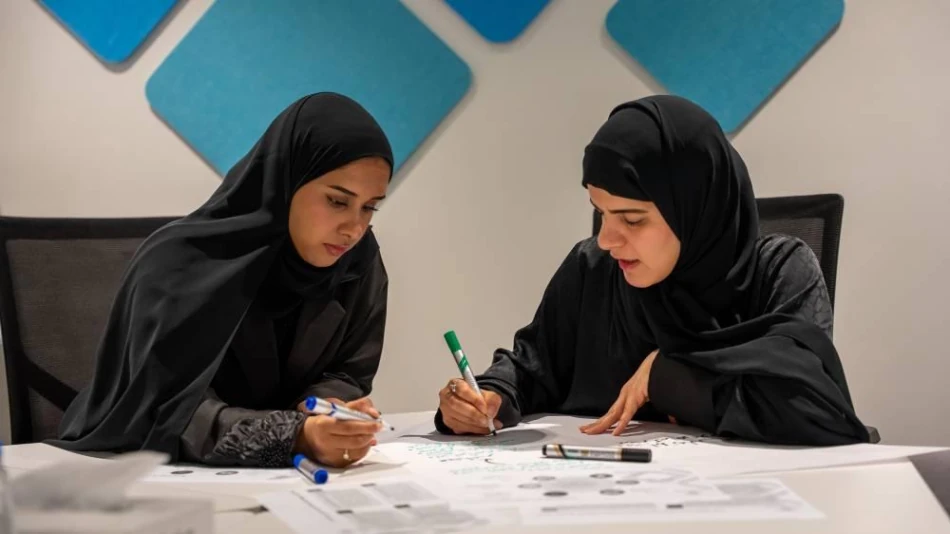
Empowering the Next Generation: 5th Cohort of 'Teacher and Proud' Program Launched
Sharjah Doubles Down on Teacher Nationalization with Fifth Cohort of Emirati Educator Program
Sharjah's Private Education Authority has launched a preparatory bridging program for the fifth cohort of its flagship "Teacher and I'm Proud" initiative, marking a significant expansion of the emirate's ambitious drive to replace expatriate teachers with qualified Emirati nationals in private schools. The program represents one of the UAE's most systematic approaches to educational workforce nationalization, directly supporting Sheikh Dr. Sultan bin Muhammad Al Qasimi's broader vision to localize private sector employment across critical industries.
Strategic Foundation Building for Career Changers
The bridging program, which began virtually on August 4 and transitioned to in-person sessions at Sharjah Education Academy on August 11, targets a specific demographic: Emirati graduates from non-educational disciplines who seek to transition into teaching careers. This approach mirrors successful teacher preparation models in Singapore and Finland, where career-change programs have helped address educator shortages while raising professional standards.
The curriculum focuses on foundational academic and linguistic skills, research methodologies, analytical thinking, and self-directed learning capabilities. Participants also receive training in interactive teaching methods and university-level study requirements, creating a comprehensive foundation before they begin their specialized diploma studies.
Addressing the Private School Challenge
Dr. Mohaddetha Al Hashemi, Chairman of Sharjah Private Education Authority, emphasized that the program reflects a strategic approach starting with teacher preparation and qualification according to best practices. This methodology acknowledges a reality facing many Gulf states: private schools heavily rely on expatriate teachers, creating potential instability and limiting opportunities for national workforce development.
The UAE's private education sector employs thousands of foreign teachers, particularly from Western countries, India, and the Philippines. While these educators bring valuable expertise, the heavy reliance on expatriate staff creates challenges around retention, cultural alignment, and long-term educational planning.
Economic and Educational Implications
Ali Al Hosani, Director General of Sharjah Private Education Authority, positioned the bridging program as a foundational step for field and academic qualification before participants begin their graduate diploma in teaching. This systematic approach suggests Sharjah recognizes that successful teacher nationalization requires more than basic certification—it demands comprehensive professional development.
From an economic perspective, teacher nationalization offers multiple benefits: reduced recruitment costs for international staff, decreased visa and housing expenses for schools, and improved teacher retention rates. Emirati teachers are more likely to remain in the education system long-term, providing stability that benefits student outcomes and institutional planning.
Learning from Regional Precedents
Sharjah's approach builds on lessons learned from other nationalization efforts across the Gulf. Saudi Arabia's teacher nationalization drive in the 2010s faced challenges when insufficient preparation led to quality concerns. The UAE appears to be avoiding these pitfalls by investing heavily in comprehensive training programs before placing nationals in classrooms.
The program's emphasis on critical thinking, classroom interaction skills, and self-regulation reflects modern educational priorities. Najla Al Mansoori, Director of Teacher and I'm Proud Affairs, noted that the program design responds to precise assessments of new teacher needs, suggesting data-driven program development rather than generic training approaches.
Long-Term Vision for Educational Sustainability
Since its 2019 launch, "Teacher and I'm Proud" has evolved into what officials describe as a developmental initiative targeting national cadres from non-educational specializations. The program combines theoretical knowledge with practical application under supervision from educational experts and professional development specialists.
This model could serve as a blueprint for other emirates and Gulf states grappling with similar workforce localization challenges. By creating structured pathways for career changers to enter education, Sharjah is building a sustainable pipeline of national educators while maintaining quality standards.
The success of this fifth cohort will likely influence the program's future expansion and could accelerate similar initiatives across the UAE's educational landscape. For private schools, the availability of well-trained Emirati teachers may eventually reduce recruitment pressures and operational costs while aligning more closely with national educational values and long-term strategic planning.
Most Viewed News

 Omar Rahman
Omar Rahman






